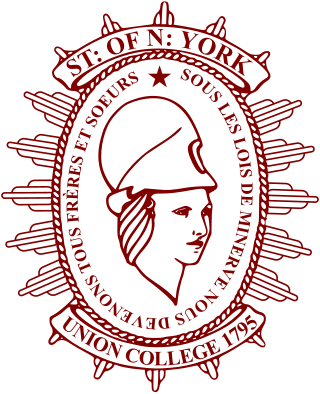Franklin is a village in Delaware County of the U.S. state of New York. As of the 2010 census, the village population was 374. The village is in the town of Franklin.

Union College is a private liberal arts college in Schenectady, New York, United States. Founded in 1795, it was the first institution of higher learning chartered by the New York State Board of Regents, and second in the state of New York, after Columbia College.

James Aloysius O'Gorman was an American attorney, judge, and politician from New York. A Democrat, he is most notable for his service as a United States Senator from March 31, 1911 to March 3, 1917.

John Haviland was an English-born American architect who was a major figure in American Neo-Classical architecture, and one of the most notable architects working from Philadelphia during the nineteenth century.

Henry Willis, also known as "Father" Willis, was an English organ player and builder, who is regarded as the foremost organ builder of the Victorian era. His company Henry Willis & Sons remains in business.
The following is a timeline of the history of the city of Baltimore, Maryland, USA.

Albert W. Fuller (1854-1934) was an American architect practicing in Albany, New York.

The Adjutant General of New York is the highest-ranking military official in the New York National Guard as the state adjutant general. The adjutant general is part of the state government's executive branch, and serves as head of the New York State Division of Military and Naval Affairs, which includes the New York Army National Guard, New York Air National Guard, the New York Guard, and the New York Naval Militia.
Charles More Preston was an American lawyer and banker from New York City.

Charles Powell Clinch was an American playwright and public official. A longtime appointed official at the U.S. Custom House in New York City, he was most notable for his service as acting Collector of the Port of New York from 1865 to 1866.
William Henry Steele was an American lawyer and politician from New York.
John B. Meyenborg was a German-American lawyer and politician from New York.
Charles Beatty Morton was an American politician from New York.
Jacob Marks was a Jewish-American lawyer, politician, and judge from New York.
Bloomfield Holmes Minch was an American businessman and politician from New Jersey.
Arthur Clarkson Butts was an American lawyer, judge, and politician from New York.
Max Warley Platzek was a Jewish-American lawyer and judge.
Joseph Koch was a Jewish-American lawyer, judge, and politician from New York.
Jacob Sidney Bernstein was a Russian-born Jewish-American lawyer, politician, and judge from New York.








